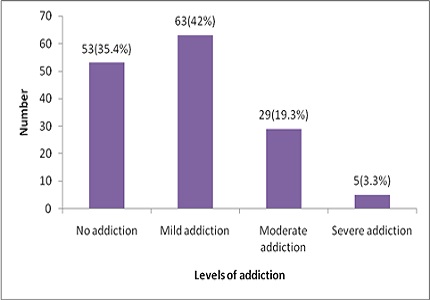Prevalence of addictive internet use and its correlates among urban school students in Tamilnadu, South India – a cross-sectional study
Abstract
Background: Use of Internet has drastically increased in the last decades. Despite of the advantages, use of it can lead to addictive behaviours that can affect various domains of a person’s life like physical, social, mental and financial wellbeing.
Materials and Methods: A cross-sectional study was conducted to assess the prevalence of Internet use and its correlates among 150 urban school students in 13-15 years age group in a selected school in Tirunelveli district, Tamilnadu, South India. Study was conducted using apredesigned, pretested questionnaire part of the questions were retrieved from Young’s 20 item Internet Addiction Test.
Results: Among the 150 study participants, 53 (35.4%) are not addicted to use of internet, 63 (42%) are in mild addiction level, 29(19.3%) are in moderate addiction level and 5(3.3%) comes under severe addiction level, 43.4% were using internet for social networking and with regard to duration of use of internet, 17% were using internet for duration of 1-2 hours a day and 6% use it for more than 2 hours a day.
Conclusion: The current study shows a higher level of internet use and addiction to it among students. Need to enhance the awareness regarding the consequences of these technologies to students.
Downloads
References
2. Spada MM. An overview of problematic internet use. Addict Behav. 2014 Jan;39(1):3-6. doi: 10.1016/j.addbeh.2013.09.007. Epub 2013 Oct 2.
3. Tzang RF, Chang CH, Chang YC. Adolescent's psychotic-like symptoms associated with Internet addiction. Psychiatry Clin Neurosci. 2015 Jun;69(6):384. doi: 10.1111/pcn.12243. Epub 2014 Nov 14.
4. Potenza MN. Should addictive disorders include non-substance-related conditions? Addiction. 2006 Sep;101 Suppl 1:142-51. [PubMed]
5. Yau YHC, Crowley MJ, Mayes LC, Potenza MN. Are internet use and video-game playing addictive behaviors? Biological, clinical and public health implications for youths and adults. Minerva Psichiatr. 2012 Sep;53(3):153-70.
6. Block JJ. Issues for DSM-V: internet addiction. Am J Psychiatry. 2008 Mar;165(3):306-7. doi: 10.1176/appi.ajp.2007.07101556. [PubMed]
7. Ni X, Yan H, Chen S, Liu Z. Factors influencing internet addiction in a sample of freshmen university students in China. Cyberpsychol Behav. 2009 Jun;12(3):327-30. doi: 10.1089/cpb.2008.0321.
8. Park SK, Kim JY, Cho CB. Prevalence of Internet addiction and correlations with family factors among South Korean adolescents. Adolescence. 2008 Winter;43(172):895-909. [PubMed]
9. van den Eijnden RJ, Spijkerman R, Vermulst AA, van Rooij TJ, Engels RC. Compulsive internet use among adolescents: bidirectional parent-child relationships. J Abnorm Child Psychol. 2010 Jan;38(1):77-89. doi: 10.1007/s10802-009-9347-8.
10. Internet addiction test [IAT] by Dr. Kimberly Young. Available from http://www.globaladdiction.org/ dldocs / GLOBALADDICTION-Scales-InternetAddictionTest.pdf
11. Olatokun WM. Internet access and usage by secondary school studentsin a Nigerian Municipality. SA Jnl Libs & Info Sci.2008; 74(2): 138-148.
12. Sharahi BY, Ahmadi A, Goodarzi T, Beigi FH, Joukar J. A Survey of the Amount of Internet Usage among High School. Procedia - Social and Behavioral Sciences. 2014; 114:610 – 616.
13. Niemz K, Griffiths M, Banyard P. Prevalence of pathological Internet use among university students and correlations with self-esteem, the General Health Questionnaire (GHQ), and disinhibition. Cyberpsychol Behav. 2005 Dec;8(6):562-70. [PubMed]
14. Anderson KJ. Internet use among college students: an exploratory study. J Am Coll Health. 2001 Jul;50(1):21-6. [PubMed]
15. Tarimo R, Kavishe G. Internet access and usage by secondary school students in Morogoro Municipality, Tanzania. International Journal of Education and Development using Information and Communication Technology. 2017;13(2): 56-69.
16. Xin M, Xing J, Pengfei W, Houru L, Mengcheng W, Hong Z. Online activities, prevalence of Internet addiction and risk factors related tofamily and school among adolescents in China. Addictive Behaviors Reports.2018; 7:14–18.

Copyright (c) 2018 Author (s). Published by Siddharth Health Research and Social Welfare Society

This work is licensed under a Creative Commons Attribution 4.0 International License.


 OAI - Open Archives Initiative
OAI - Open Archives Initiative


